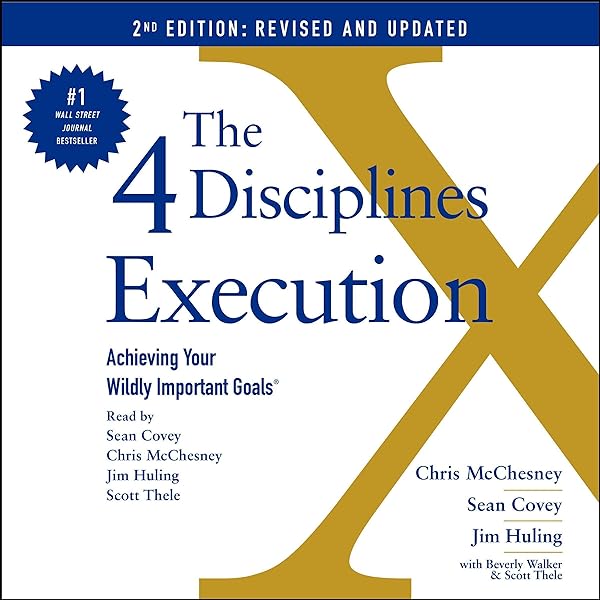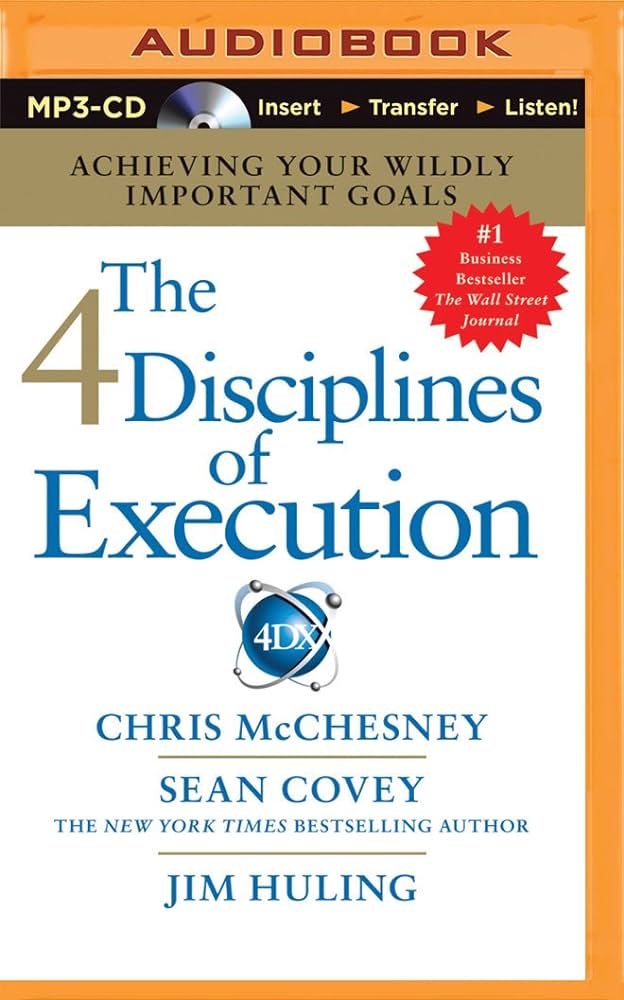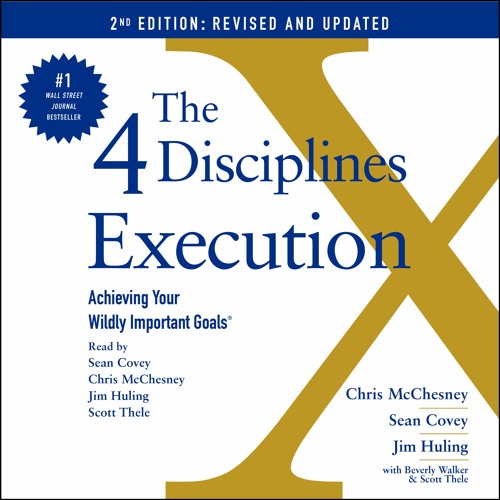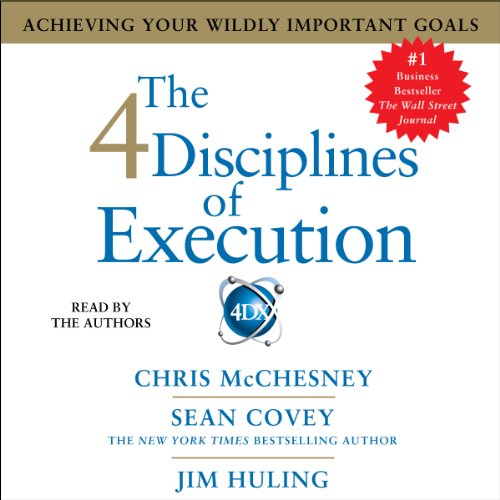Sean Covey’s “4 Disciplines of Execution” audiobook provides actionable strategies for achieving business goals. It emphasizes focus, leverage, engagement, and accountability.
The “4 Disciplines of Execution” by Sean Covey is a practical guide for leaders. It outlines four key principles to help organizations achieve their most critical goals. The first discipline, Focus on the Wildly Important, encourages prioritizing essential objectives. The second, Act on the Lead Measures, highlights the importance of actionable metrics.
The third, Keep a Compelling Scoreboard, emphasizes tracking progress visibly. Lastly, Create a Cadence of Accountability stresses regular follow-ups and commitments. This audiobook is ideal for anyone looking to improve execution and achieve significant results in their organization.

Introduction To ‘4 Disciplines Of Execution’
The ‘4 Disciplines of Execution’ by Sean Covey is a powerful audiobook. It offers a roadmap for achieving goals. This method is known as 4DX. It helps teams focus on what matters most.
The Genesis Of A Productivity Framework
The 4DX framework was born from real-world challenges. Many teams struggle with executing plans. They have great ideas but fail to deliver results. This need led to the creation of 4DX.
The framework includes four key disciplines:
- Focus on the Wildly Important
- Act on Lead Measures
- Keep a Compelling Scoreboard
- Create a Cadence of Accountability
Sean Covey’s Role In Shaping 4dx
Sean Covey played a vital role in developing 4DX. He and his team at FranklinCovey wanted to solve execution problems. They researched and tested various methods. Covey’s insights were crucial in refining 4DX.
Covey’s background in leadership and productivity helped shape this framework. He used his knowledge to craft a system that works for any team. His commitment ensured that 4DX is practical and effective.
| Discipline | Description |
|---|---|
| Focus on the Wildly Important | Choose 1-2 goals to prioritize |
| Act on Lead Measures | Track activities that drive success |
| Keep a Compelling Scoreboard | Make progress visible to everyone |
| Create a Cadence of Accountability | Hold regular check-ins to ensure progress |
The audiobook version of ‘4 Disciplines of Execution’ brings these ideas to life. Sean Covey’s narration makes the content engaging. It’s a must-listen for anyone seeking better results.
The First Discipline: Focus On The Wildly Important Goals (wigs)
The First Discipline in Sean Covey’s “4 Disciplines of Execution” audiobook is all about focusing on the Wildly Important Goals (WIGs). This discipline teaches you to concentrate on what truly matters. When you focus on these key goals, you can make significant progress.
Identifying Your Wigs
Identifying your Wildly Important Goals is the first step. Here’s how you can do it:
- List your potential goals.
- Evaluate the impact of each goal.
- Choose the goals with the highest impact.
- Ensure these goals are clear and specific.
By focusing on your WIGs, you direct your energy towards what really matters. This focus can drive significant results.
Strategies For Narrowing Focus
Narrowing your focus is crucial for achieving your WIGs. Use these strategies to maintain your focus:
- Limit your goals to one or two at a time.
- Prioritize tasks that contribute directly to your WIGs.
- Eliminate distractions and avoid multitasking.
- Regularly review your progress and adjust as needed.
Staying focused on your WIGs helps you achieve them faster. Use these strategies to maintain your focus and drive success.
The Second Discipline: Act On The Lead Measures
Sean Covey’s The 4 Disciplines of Execution audiobook is a powerful guide for achieving your goals. The Second Discipline, Act on the Lead Measures, focuses on measuring actions that drive success. This discipline is crucial for achieving desired outcomes.
Differentiating Lead From Lag Measures
Lead measures predict future success. Lag measures show past performance. Understanding the difference is essential for effective planning.
Lead measures are proactive and controllable. They help predict future results. These measures focus on actions that drive success.
Lag measures, on the other hand, are reactive. They reflect past achievements. Examples include revenue, profit, and customer satisfaction scores.
To achieve goals, focus on lead measures. They guide daily actions. This focus ensures progress and success.
Implementing Effective Lead Measures
Effective lead measures should be specific and actionable. They need to be within your control. Here are some tips for implementing them:
- Identify Key Drivers: Determine actions that drive success.
- Set Clear Targets: Define specific goals for each action.
- Track Progress: Monitor your actions regularly.
- Adjust as Needed: Make changes to improve performance.
Use a table to organize lead measures and track progress:
| Lead Measure | Target | Current Status | Actions Needed |
|---|---|---|---|
| Weekly Sales Calls | 20 Calls | 15 Calls | Increase Call Frequency |
| Customer Follow-ups | 10 Follow-ups | 8 Follow-ups | Schedule More Follow-ups |
Implementing lead measures ensures focused efforts. It drives consistent progress. Act on lead measures to achieve your goals.
The Third Discipline: Keep A Compelling Scoreboard
Sean Covey’s audiobook, The 4 Disciplines of Execution, reveals how to achieve your goals. One key principle is The Third Discipline: Keep a Compelling Scoreboard. This discipline emphasizes tracking progress visually. It ensures team members stay motivated and focused.
Designing An Engaging Scoreboard
Creating a compelling scoreboard requires attention to detail. The scoreboard should be clear and easy to read. It must show progress at a glance. Use colors, charts, and graphs to make it engaging.
| Element | Description |
|---|---|
| Clarity | Ensure the scoreboard is simple and understandable. |
| Visual Appeal | Use colors and graphics to capture attention. |
| Real-Time Updates | Keep the scoreboard updated with current data. |
The Psychology Behind Visual Tracking
Humans are visual creatures. Visual tracking helps in understanding progress quickly. A compelling scoreboard taps into this psychology.
Seeing progress boosts motivation. It creates a sense of achievement. Team members feel more engaged and committed.
- Immediate Feedback: Visuals provide instant progress updates.
- Increased Accountability: Public scoreboards create a sense of responsibility.
- Enhanced Focus: Clear visuals help prioritize tasks.
A well-designed scoreboard makes goals tangible. It turns abstract targets into visible achievements.
The Fourth Discipline: Create A Cadence Of Accountability
The Fourth Discipline in Sean Covey’s “4 Disciplines of Execution” audiobook focuses on creating a rhythm of accountability. This discipline ensures that teams stay committed and on track. Regular meetings and follow-ups are essential in this process.
Establishing Regular Accountability Sessions
To maintain the cadence of accountability, establish regular sessions. These sessions should be consistent and structured. Weekly or bi-weekly meetings work best.
During these sessions, review goals and progress. Discuss any roadblocks and find solutions. Everyone should have a chance to speak. This keeps the team engaged and responsible.
Tips For Effective Team Meetings
- Set a clear agenda: List topics to cover.
- Start on time: Respect everyone’s schedule.
- Encourage participation: Everyone should share updates.
- Focus on solutions: Address challenges and plan actions.
- Track progress: Use charts or tables to show progress.
Here is a sample table to track meeting progress:
| Date | Agenda | Progress | Next Steps |
|---|---|---|---|
| 2023-10-01 | Review Q3 Goals | 75% Complete | Plan Q4 Actions |
| 2023-10-15 | Address Challenges | Identified Issues | Implement Solutions |
Using these tips and tools, teams can create a strong cadence of accountability. This leads to better performance and achieving goals.

Applying The 4 Disciplines In Various Settings
The 4 Disciplines of Execution (4DX) by Sean Covey offers a framework for achieving goals. These disciplines can be applied in many environments. Below, we explore how 4DX works in corporate settings and personal life.
Case Studies In Corporate Environments
Many companies have successfully used 4DX to achieve their goals. They focus on four main disciplines:
- Focus on the Wildly Important: Identify key goals.
- Act on Lead Measures: Track progress with measurable actions.
- Keep a Compelling Scoreboard: Make goals visible.
- Create a Cadence of Accountability: Regular check-ins.
Here are some case studies:
| Company | Challenge | Outcome |
|---|---|---|
| ABC Corp | Low employee engagement | Increased by 30% |
| XYZ Ltd | Declining sales | Sales grew 20% |
Adapting 4dx For Personal Goals
The 4DX framework is not just for businesses. Individuals can use it too. Here’s how:
- Focus on the Wildly Important: Choose a key personal goal.
- Act on Lead Measures: Break the goal into small steps.
- Keep a Compelling Scoreboard: Track progress daily.
- Create a Cadence of Accountability: Review weekly.
For example, someone wanting to run a marathon could:
- Set a goal to run 5 miles weekly.
- Track daily runs on a chart.
- Review progress every Sunday.
This method keeps motivation high and progress steady.
Challenges And Solutions In Implementing 4dx
Implementing the 4 Disciplines of Execution (4DX) can be transformative for organizations. However, numerous challenges can arise during the process. Understanding these challenges and finding effective solutions can make the journey smoother and more successful.
Common Pitfalls And How To Avoid Them
Many organizations face common pitfalls when implementing 4DX. Avoiding these pitfalls is crucial for achieving success.
- Lack of focus: Teams often set too many goals. Focus on one or two Wildly Important Goals (WIGs).
- Inconsistent tracking: Regularly update and review your scoreboards. Consistency is key.
- Inadequate leadership: Leaders must be committed and lead by example. Their dedication inspires the team.
- Ignoring the whirlwind: Day-to-day tasks can overwhelm teams. Allocate specific time for WIGs to ensure progress.
Overcoming Resistance To Change
Resistance to change is a natural reaction. Overcoming it requires strategic actions and effective communication.
| Challenge | Solution |
|---|---|
| Fear of the unknown: Team members fear new processes. | Provide clear information and training. Use examples and success stories. |
| Comfort with the status quo: Change disrupts routines. | Explain the benefits of 4DX. Show how it improves performance. |
| Lack of trust: Team members may not trust the new system. | Build trust through transparency and regular updates. Involve the team in the process. |
Ensuring everyone buys into the process is essential. Hold regular meetings and encourage open feedback. Celebrate small wins to keep morale high. By addressing these challenges head-on, implementing 4DX can be a rewarding and successful journey for any organization.

Conclusion: Transforming Productivity With 4dx
Sean Covey’s 4 Disciplines of Execution (4DX) audiobook provides a systematic approach to achieving goals. This method transforms productivity by focusing on the most important objectives. Let’s explore how 4DX impacts goal achievement and its future directions.
The Impact Of 4dx On Achieving Goals
The 4DX framework centers on four key disciplines:
- Focus on the Wildly Important: Concentrate on one or two crucial goals.
- Act on Lead Measures: Identify measures that lead to goal achievement.
- Keep a Compelling Scoreboard: Track progress visually and regularly.
- Create a Cadence of Accountability: Hold regular accountability sessions.
Implementing these disciplines fosters better focus and accountability. Teams become more aligned and motivated. This structured approach helps in achieving significant goals effectively.
Future Directions For The 4 Disciplines Of Execution
The future of 4DX looks promising as organizations seek better execution strategies. The adoption of digital tools and platforms can enhance the 4DX process:
- Integration with Digital Tools: Use apps for tracking lead measures and scoreboards.
- Remote Work Adaptations: Apply 4DX principles in remote team settings.
- Continuous Improvement: Regularly refine and adapt the disciplines to changing needs.
As businesses evolve, the 4 Disciplines of Execution will continue to play a crucial role. They provide a clear path to achieving goals and driving productivity.
Conclusion
The “4 Disciplines of Execution” audiobook by Sean Covey offers actionable strategies for achieving goals. It emphasizes focus, leverage, engagement, and accountability. Applying these disciplines can transform both personal and professional endeavors. Make this audiobook a part of your toolkit for success and witness remarkable changes in your execution and results.



